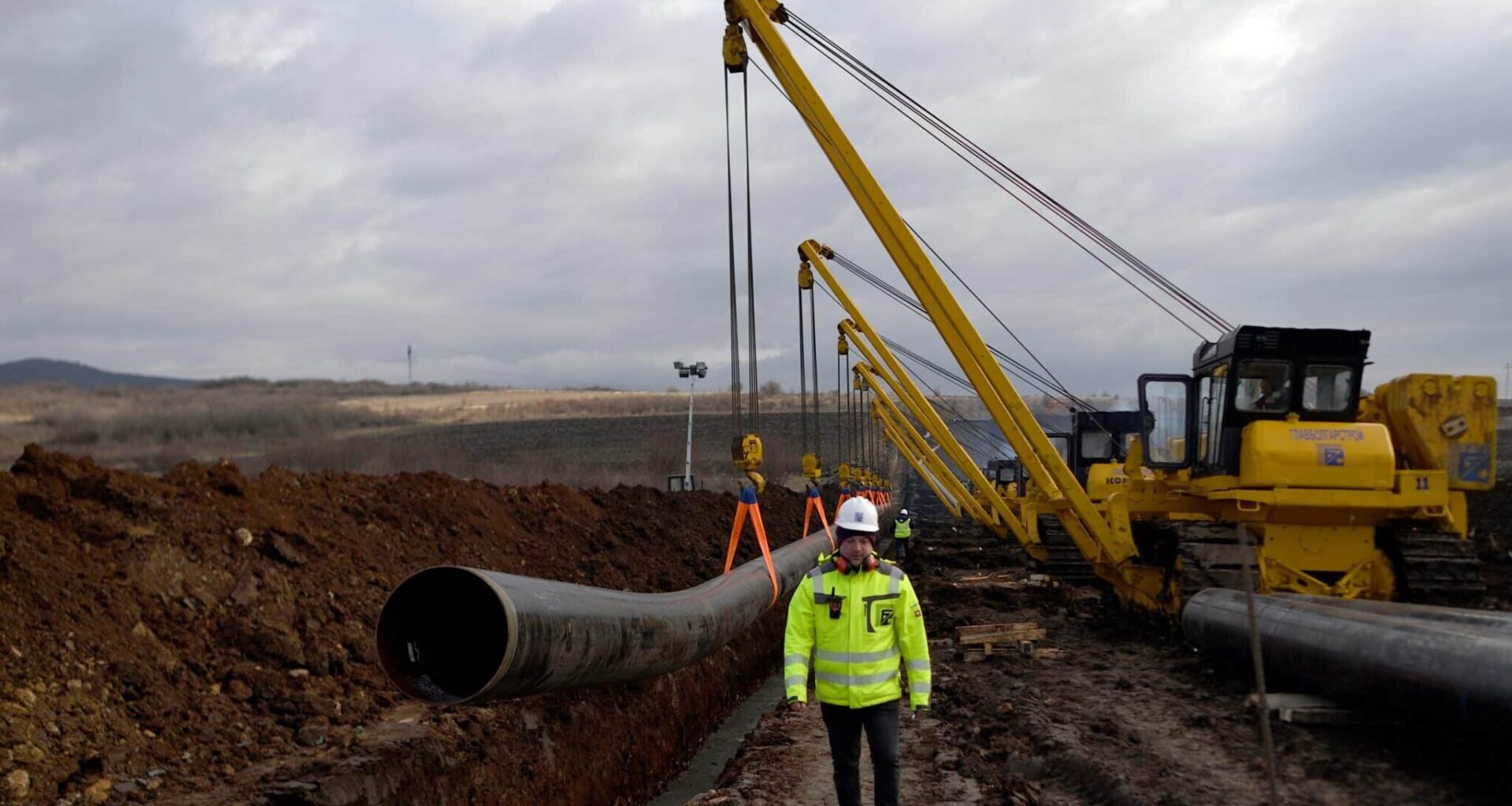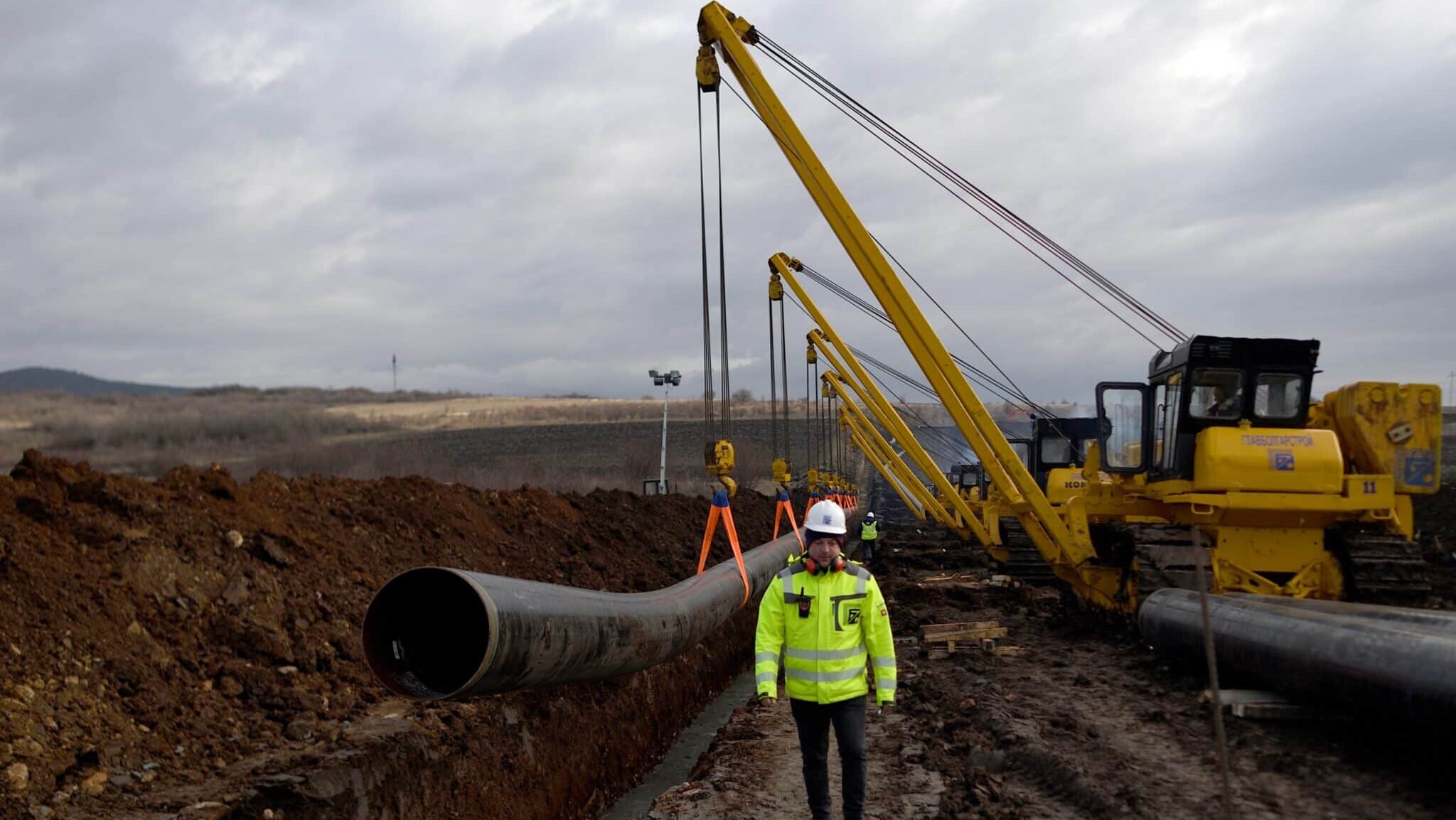Construction work on the ‘Bulgaria and Serbia’ (IBS) gas interconnection in the village of Goletovtsi, Bulgaria, February 2023. Photo: EPA/VASSIL DONEV.
Serbian President Aleksandar Vucic on Monday evening described the Council of the European Union’s draft proposal to ban all Russian natural gas imports in the EU as “not great” – and said his country, which is overwhelmingly dependent on Russian gas, will find it difficult to find alternative ways to import it or to find alternative sources for supplies.
Vucic suggested that one possible solution might be to import via other countries, such as his ally Hungary, another country that will be deeply affected by the ban, but he said that would require major infrastructure investment.
“You have to build a new gas interconnector. To build all that, to build a reversible phase towards Hungary, so that gas can return, and not just go in the direction of Hungary, to build an interconnector with North Macedonia, [and] when we build all that, we don’t know where to get so much gas if it’s not Russian,” Vucic told media.
“[Even] when we do it all, again, the question arises of how we are going to compensate for having to pay a 30-40 per cent higher price [for non-Russian gas],” he added.
He spoke after EU energy ministers meeting in Luxembourg on Monday agreed to completely ban the import of Russian gas into the EU. The ban for short-term contracts will come into force on June 17, 2026, while for longer-term contracts, it will start on January 1, 2028.
Russian pipeline gas currently only enters the EU via TurkStream, which runs under the Black Sea to Turkey, then through EU member state Bulgaria, across Serbia and into Hungary.
Slovakia used to receive Russian gas via the Brotherhood pipeline that transits Ukraine, but this ended on January 1 when the transit agreement between Ukraine and Gazprom expired and Kyiv declared it would not renew it. Since then, Slovakia’s supplies of Russian gas have been rerouted via TurkStream.
Hungary and Slovakia are among the EU countries that will be hardest hit by the ban. Out of the non-EU countries, Serbia will suffer the most.
Hungary and Slovakia have implacably opposed EU moves to end Russian oil and gas supplies, arguing there are no economically feasible alternatives – a claim most energy analysts dispute. The two countries have actually increased their Russian gas purchases, as other EU member states eliminate them.
Under a long-term gas contract signed in 2021, Hungary was already buying 4.5 billion cubic metres a year (cm/y) of gas from Gazprom. It signed a new deal in 2024 to increase that to 6.7 billion cm/y.
To avoid these countries vetoing the draft at the European Council, the proposal approved by the energy ministers on Monday is billed as a trade measure, which only needs a qualified majority of capitals to approve it rather than unanimity.
Hungarian Prime Minister Viktor Orban did not comment about the proposal, but the Hungarian Minister of Foreign Affairs and Trade, Peter Szijjarto, said his government may take legal action against the EU ban.
“It’s a big scandal [and]… we have to put into consideration some legal steps,” Szijjarto was quoted as saying on the sidelines of the energy ministers meeting. “This is a clear violation of the European Union treaty.”
Serbia is highly dependent on imported gas, and can only supply 10 per cent of consumption from domestic production. According to Serbia’s Energy Balance for 2025, the plan is to use some 1.1 million cm of it for production of electricity and heat in 2025.
The biggest share of imported gas comes from Russia, while some smaller amounts are imported from Azerbaijan.
Serbia’s last long-term contract with Gazprom expired at the end of 2021. In November 2021 the Serbian and Russian presidents agreed that, for the following six months, Serbia would continue to pay 270 US dollars per 1,000 cm of gas.
In May 2022 they agreed that a new three-year deal would be signed. This new deal has been postponed multiple times during 2025.

